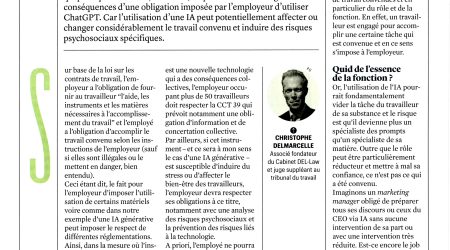"Ghosn case": Is it possible to dismiss an employee for a serious reason based on events in their private life? Does the contract automatically end in the event of an arrest?
Posted the 19 November 2018What is now the "Carlos Ghosn case" is making headlines and raises the question of an employee, like Mr. Ghosn, who would be charged with fraud or even arrested preventively.
"Affaire Ghosn": Is it possible to dismiss an employee for serious misconduct due to private life events? Does the contract automatically end in the event of an arrest?
A private life event can be a serious reason if it undermines the employer's trust.
In labour law, serious misconduct refers to any fault so severe that it immediately makes it impossible to continue the employment relationship due to the complete loss of trust resulting from it for the employer towards the employee. Since a 1987 ruling by the Court of Cassation, case law has allowed private life actions to constitute serious misconduct when they are likely to destroy the employer’s trust.
The situation must therefore be assessed in concreto, considering both the facts in question and the employee's position and the company’s context. It must be determined whether the private misconduct impacts the continuation of the employment relationship and whether this impact is significant enough to make continued professional collaboration definitively and immediately impossible.
In concreto, fraud will often be a serious reason for a CEO, commercial director, or financial director, as the employer must have complete trust in them, not to mention their roles as "figureheads."
Some private life events will justify dismissal for serious misconduct only when directly linked to a specific function. Tax fraud (or inappropriate public statements) can clearly be a serious reason for a leader like a CEO or financial director because of the high level of autonomy and trust they have, which by implication requires them to be impeccable. The role of setting an example internally and representing externally, for instance, for a communications officer who is the company’s image, will also justify the employer's trust being undermined by fraud. However, this may not be enough for a worker on machinery or a subordinate employee with little autonomy, for whom the employer’s expectations of trust are lower.
Other private life events will justify dismissal for serious misconduct due to their extreme gravity, regardless of the employee's role. This includes acts like immoral conduct, rape, paedophilia, murder, drug trafficking, or attempted murder. Case law provides numerous examples.
But the serious reason must be proven!
It must be established – with the employer carrying the burden of proof. Given the presumption of innocence, the mere indictment of the employee or even their pre-trial detention may not be enough, without additional external evidence such as a confession or acknowledgment.
Related articles

Is an employer allowed to mandate the use of artificial intelligence tools by employees ? (Trends, 17-07-2025)

Caution if a former colleague opposed to your employer asks you to testify in their favor
